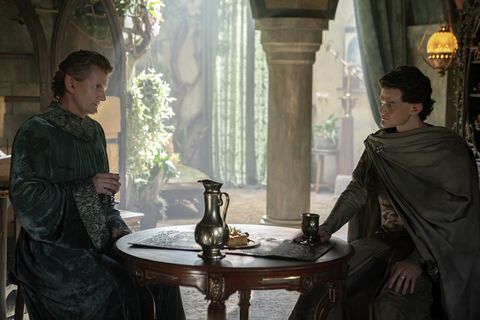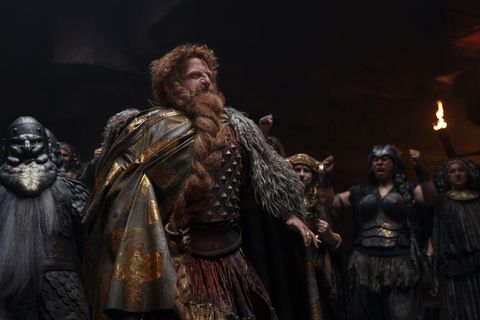“That’s not who we are,” Nori tells her friend Poppy Proudfellow (Megan Richards), when the latter suggests they abandon a naked star-man in the meteor crater he created. It’s a sentiment that could easily veer mawkish, too virtuous to maintain its authenticity, but Markella Kavenaugh’s delivery makes Nori’s words ring true. That’s always been the strength of the Lord of the Rings—and, by extension, the strength of The Rings of Power, should its ambitions be realized. J.R.R. Tolkien’s world is dark, but never is it cynical. It is the small but mighty acts of good that will triumph, always, even if its battle takes millennia to play out. You could dismiss this ethos as trite, if you like—you’d be far from the first—but to do so would be to ignore the foundation of this entire beloved franchise.
And so, at the beginning of episode 2 of The Rings of Power, Nori surveys the naked man in the crater. When he touches her hand, the whole world seems to quake, and the explosion’s debris floats around them. But his strength is failing; he can only maintain this trick for a few heart-pounding moments. Nori insists on getting him somewhere safe, away from where the wolves might attack him. “Anybody finds out that we helped a stranger, and anything bad that happens the next three seasons will be our fault,” Poppy argues. But Nori’s used to breaking a few rules in pursuit of a good story. She and Poppy hide The Stranger in one of their make-shift Harfoot holes, covered in moss and branches, where they pray he’ll be safe while they sleep.
The next morning, Nori discovers The Stranger (Daniel Weyman), awake, scratching indeterminable marks into a rock. He can’t remember his own name, nor does he seem capable of communicating much beyond grunts and gasps. He eats snails all wrong. When asked where he’s from, if there are others like him, he carves more lines into the mud, whispering only the words, “Mana” and “Urë.” Poppy interrupts before Nori and The Stranger can make much headway in their chat: Nori’s father has taken a fall, and his foot looks in bad shape. It’s broken, for sure, but the site around the break looks brackish, almost as if it’s infected with the same black goo Arondir and Bronwyn discovered in a cow’s belly in the Southlands.
More From ELLE

Speaking of Arondir and Bronwyn, they’re out exploring the smoldering ruins of Hordern, where the buildings are razed but there’s not a body to be found. They discover a tunnel beneath one of the homes, and Arondir decides to chart it out while Bronwyn returns to Tirharad to warn her people. Unfortunately, her kin don’t seem altogether concerned about the “bodies that were swallowed up like flies,” especially given the word is coming from Bronwyn, whose rumored relationship with an Elf has turned her own people reproachful.
That reproach angers her son, Theo (Tyroe Muhafidin), already an angry boy, who discovers that the mice scurrying under his floorboards aren’t mice at all. They’re Orcs. Arondir discovers them, too, in the tunnels beneath Hordern, where he’s overtaken among a tangle of roots. But in Tirharad, Theo and Bronwyn are on their own, fighting off an Orc with little but garden shears, herbal powders, and a rope. After a scuffle where Theo emits a few too many melodramatic cries of pain, Bronwyn brings the Orc’s head to the local pub as proof of her warning, and the people move out from their little homestead—including Theo, who totes along the broken Sauron sword, which slowly re-builds as it saps blood from a wound on his hand. Not a good sign!
Meanwhile, in Eregion, realm of the Elven-smiths, we finally learn of Lord Celebrimbor’s ambition: He aspires to “grow beyond petty works of jewel-craft and devise something of real power.” (I wonder what that could possibly be!!) In order to do that, he needs to build a forge, and to do that he needs to construct a tower, and to do that he needs a lot of fast and skilled workers. Elrond recommends enlisting the Dwarves, and so he and Celebrimbor chart a course for the remarkable halls of Khazad-dûm, which fans of Peter Jackson’s films will recognize as the eventually desolate mines of Moria under the Misty Mountains.
(Allow me one small complaint here: How is it that Elrond and Celebrimbor magically manifest outside Khazad-dûm, wearing the same clothing as in Eregion—ostensibly miles away—without a horse or an eagle in sight? Did they teleport? Inexplicable fantasy fast-traveling never ceases to enrage me.)
Anyway, in Khazad-dûm, Elrond expects to be greeted warmly by his old friend Prince Durin (Owain Arthur), but he’s committed the ultimate sin against a Dwarf: He missed a party. It’s been 20 years since Elrond came to visit his pal—for an Elf only a blip, but for a Dwarf much longer—and, in that time, Durin has gotten married and had two children, the adorable trouble-makers Gerda and Gamli. To gain entrance to Durin’s home, Elrond’s forced to invoke the Rite of Sigin-tarâg, which amounts to a pissing match between Dwarf and Elf as they battle to see who can break the most stones with a hammer. (Apparently a unique point of Dwarven pride.) Elrond is forced to forfeit, but he’s smart enough to request Durin escort him to the exit personally, and he takes the extra time together as an opportunity to learn of the rift between them.
Durin tries to play it cool, but Dwarves were never particularly known for smooth delivery. He eventually explodes: What kind of friend misses their bestie’s wedding? The birth of their children? “A life you missed!” he shouts, and Elrond appears genuinely saddened and ashamed, a not insignificant development for an Elf. Still, he’s nothing if not strategic. He asks for the opportunity not only to apologize to Durin, but to the prince’s wife and kids as well. He means it, but he’s also buying himself more time to bring forth Celebrimbor’s proposal.
Thankfully, Princess Disa (an absolutely splendid Sophia Nomvete), Durin’s wife, will have none of her husband’s grudge-keeping. She wraps Elrond in an enveloping hug and insists he stay for dinner, where she tells him of how she and Durin met. (An altogether endearing story of how she was “resonating” a silver deposit when the prince arrived to check on her crew—and then returned, again and again.) Elrond notices that Durin has planted a sapling of the Elvish Great Tree of Lindon in his home, and he soothes the prince’s anger with a compliment: “How could it not grow, in a home like yours?” And so Durin takes Elrond’s request to his father, King Durin III, who accuses his son of having a soft spot for the Elves. Together, they survey a box, whose contents we don’t have the privilege of seeing just yet.
Elsewhere, in the Sundering Seas, Galadriel’s getting her workout in. She’s been swimming for, by my estimate, a million hours, but she seems only vaguely exhausted from maintaining a good-form freestyle. A strung-together mess of flotsam approaches in the distance, carrying with it a handful of survivors, so she hides her pointy ears behind a lock of hair before climbing aboard. It doesn’t take long for this ragtag band of shipwrecked misfits to a) uncover her pesky ears and b) encounter a giant sea worm, which takes out the majority of them before a man named Halbrand (Charlie Vickers) rescues Galadriel from the depths. He gleans that she’s a runaway, whether running “toward or from something I haven’t yet decided,” he says. But he’s got a bigger bombshell to reveal: He himself is a runway, having escaped the Southlands not with Elves biting at his ankles, but Orcs. Now, Galadriel the Orc Slayer is listening.
In spite of her interest in little other than her mission, Halbrand warms to her enough to rescue her (again) when a storm overtakes their little scrap of driftwood. They’re bound together now, and I’d be surprised if they leave each other’s sides often in the coming episodes—especially now that a mysterious someone on a grand ship has discovered their almost-lifeless bodies adrift in the Seas.
Back in Rhovanion, Nori and Poppy tell The Stranger that it’s time for their band of Harfoots to migrate, meaning they can do no more to help him. Because he’s not exactly the best with words, The Stranger uses a swarm of fireflies to communicate his feelings about their imminent departure: He whispers to these bugs, in a scene eerily reminiscent of Gandalf’s incantations to a moth in The Fellowship of the Ring. One by one, they align into a constellation, and Nori realizes her work is not yet done; the Stranger wants her to help him find these stars. But there’s something very wrong with his magic—when he collapses, so too do the fireflies, sputtering and dying in a circle around him.
These omens do not bode well for our cast, spread out among Middle-Earth, and I have little doubt they’ll soon discover and relish one another’s company. But don’t expect any of them to shy away from the rapidly encroaching danger; it just isn’t who they are.
Lauren Puckett-Pope is an associate editor at ELLE, where she covers news and culture.






